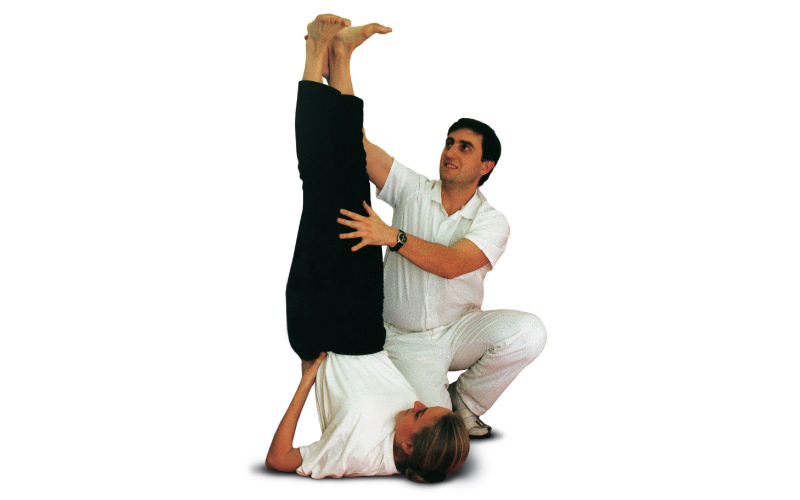
For the Improvement of Respiratory Function
The breath plays an essential role in all Yoga techniques and exercises. Investigations have revealed that most people breathe too shallow, without using the full potential of the lungs. Due to this, the body is inadequately supplied with oxygen. Metabolic function is reduced and as a result, physical wellbeing is considerably impaired.
Through specific physical exercises, relaxation and breathing techniques, the breathing process becomes more conscious and deepens in a natural way. With regular practice, we gradually learn to eliminate poor breathing habits and replace them with deep, relaxed breathing. Apart from the benefits to physical and mental health, there is also a clear improvement in the body's immune system and vitality.
Our breathing process not only has an influence on our physical wellbeing, but also on our emotional and mental harmony. Stress and anxiety cause us to breathe rapid and shallow. When we are relaxed, the breath is slow and deep. In stressful situations, we have the possibility of regaining our inner balance through conscious, deep breathing. We can learn to respond to the pressures of everyday and professional life with more composure. In this way we can have a positive influence on our physical and mental wellbeing.
The exercise series of “Yoga in Daily Life” assists everyone in achieving healthy breathing and those with respiratory disorders such as Asthma or Chronic Bronchitis also find immense relief with the aid of these practices.
The psychic component of Asthma plays an especially large role in this disorder. Relaxation and breath exercises, together with changes in lifestyle, can achieve a cure of this disorder, or at least greatly improve respiratory function.
Cardiovascular Disease
An important objective of the Yoga exercises and disciplines is to eliminate the risk factors that form the basis of cardiovascular disease. Poor diet, stress and lack of adequate exercise are typical factors involved in this disease. Regular practice of the systematically designed Yoga exercises greatly improves cardiac function by stimulating circulation and toning the entire vascular system. Specific breath exercises enhance absorption of oxygen and promote elimination of carbon dioxide and other impurities from the body. Gradually the body’s natural state of balance returns as oxygen supply is re-established. The relaxation techniques allows both profound physical and mental relaxation to take place.
Functional disorders of the cardiovascular system have become a widespread problem and statistical evidence points to an ever increasing tendency towards cardiac and vascular disease worldwide. This is why in the system of “Yoga in Daily Life” the physical, breathing and relaxation exercises have been adapted to accommodate this problem.
Professor Jarmila Motajova, MD from the University of Bratislava, worked for five years within the framework of a scientific study on the application of Yoga Exercises in the rehabilitation of heart conditions. A group of patients practiced specific exercises from the system of “Yoga in Daily Life”. This group was closely monitored and examined regularly. The results of the technical data (e.g. pulse rates, blood pressure and other functional parameters), fully confirmed the success of the Yoga Exercises in strengthening the health of the heart.
Rheumatic Complaints
It has been found that many people suffer rheumatic changes to the bones, joints and muscles due to lifestyle factors, such as overeating, high consumption of animal protein and fat, lack of physical exercise and poor posture. All these factors lead to degenerative and inflammatory changes of the muscles and joints, resulting in joint stiffness and the experience of strong pain.
Yoga exercises not only serve as a helpful therapy in relieving existing pain, but also act in the prevention of stiffness of the spine and rheumatic changes of the joints. The physical exercises stretch and relax shortened muscles and strengthen weak muscles. This provides a corresponding stability and support for the joints. Yoga exercises use the full range of movement of the joints, as far as possible without pain. This greatly improves joint mobility and enhances blood circulation to the joint capsule. The body thereby gradually regains a healthy flexibility, in a natural way.
The body’s metabolism is stimulated by special breath exercises that balance and harmonise the Autonomic Nervous System, thereby encouraging relaxation and physical wellbeing.
The effectiveness of Yoga Exercise was validated in an important investigation at the world famous health resort of Piestany in Slovakia. A team of medical specialists, consisting of three Doctors, a Psychologist and a Yoga Instructor, examined the effect of the systematic practice of “Yoga in Daily Life” on patients suffering Rheumatoid Spondylitis.
Patients of one group, who practiced specific physical and breath exercises from the system of “Yoga in Daily Life” were compared with another group of patients who were treated with classical rehabilitation exercises and techniques. The outcome of this study revealed noticeable improvement in mobility and lung parameters, as well as substantial reduction of pain.
The success of the exercise series “Yoga in Daily Life” in relieving problems related to joint and spine mobility is primarily due to its holistic effects. The far-reaching benefits of these exercises not only impart a physical improvement, but also induce mental calm as a result of the relaxation techniques. Practice of the relaxation exercises assists patients to respond more appropriately to stress and nervous tension, thus allowing them to better manage their professional and family responsibilities.